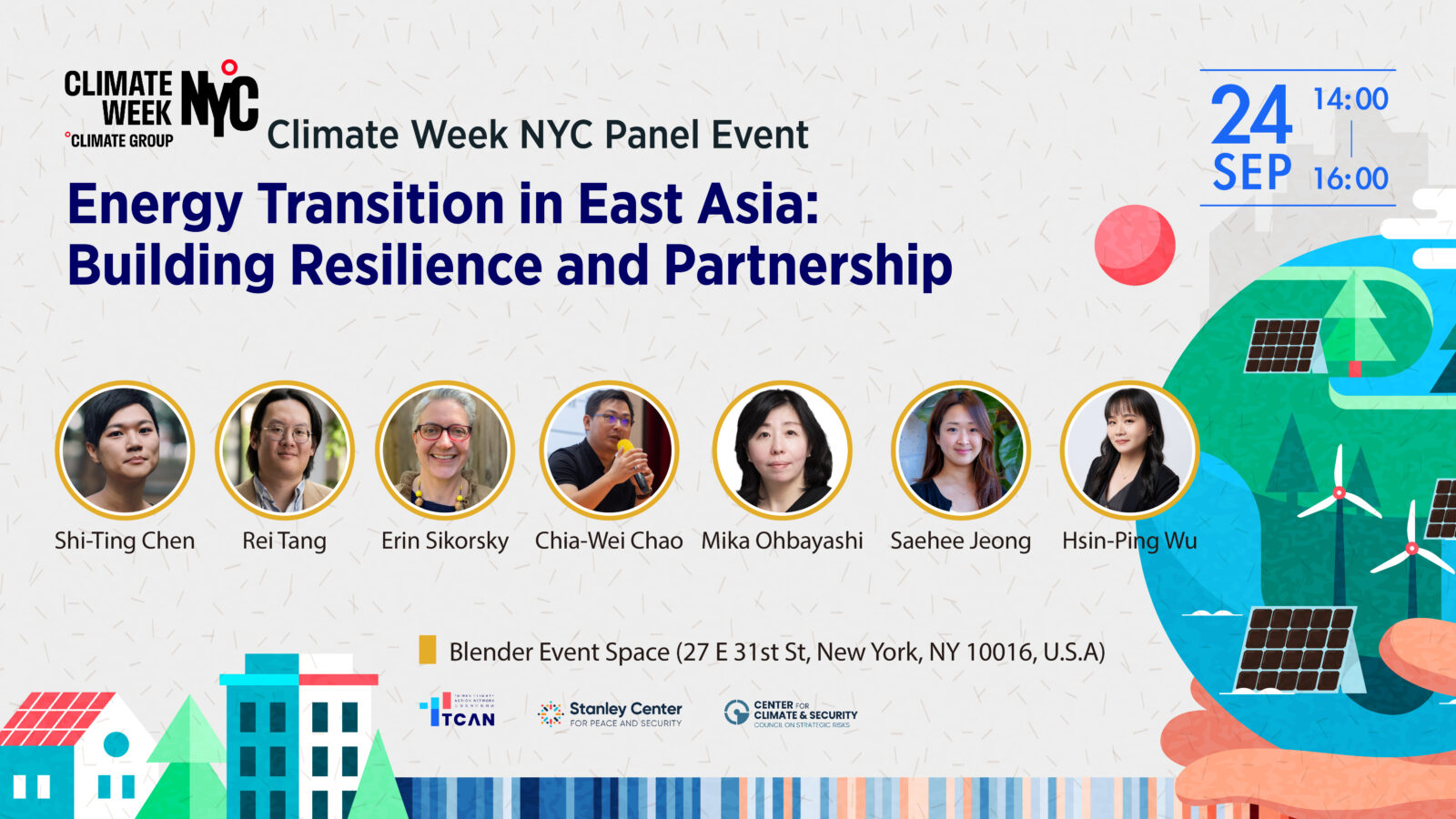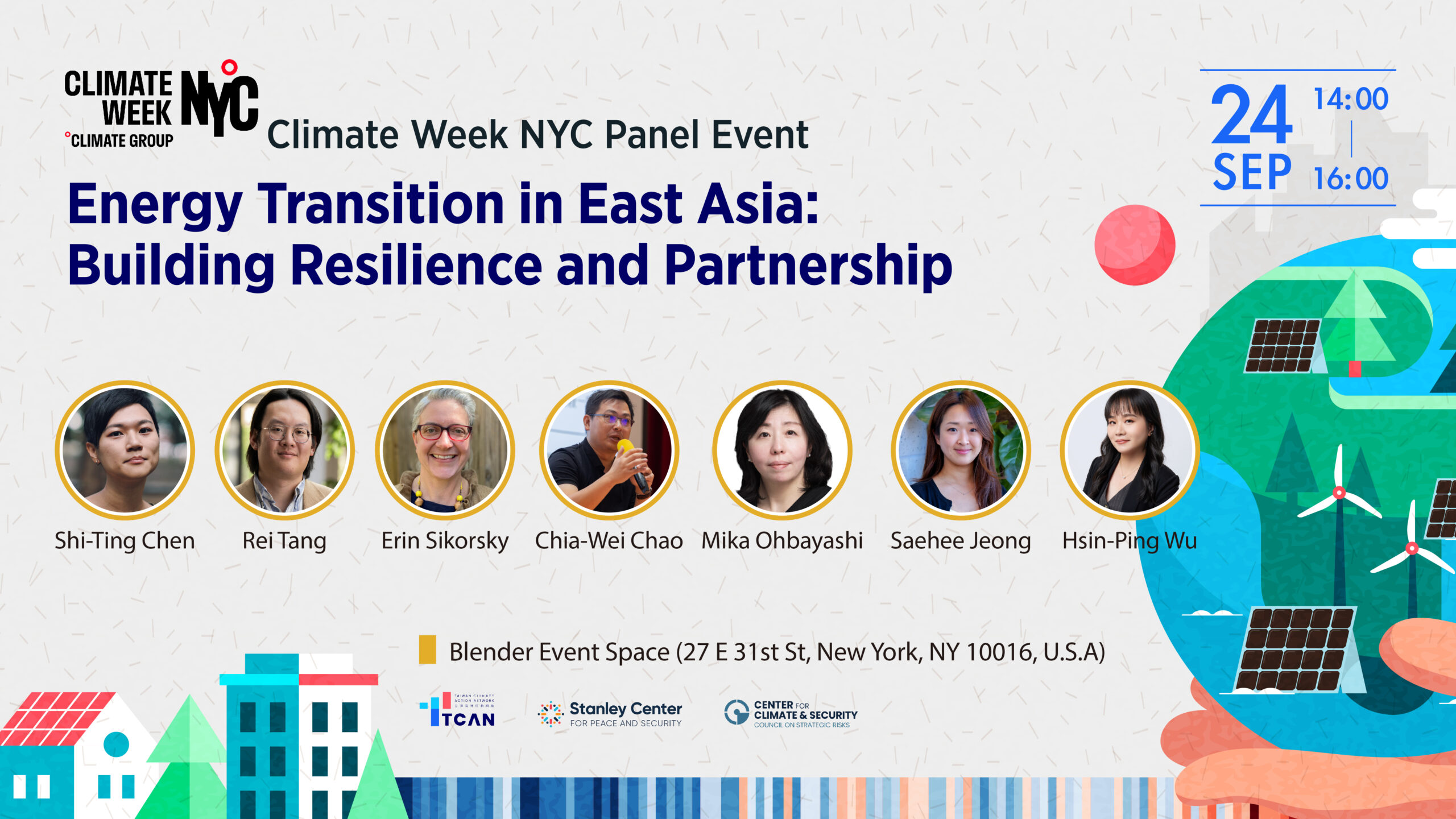
Time: Tuesday, 24th September, 2 – 4 PM EST
Venue: Blender Event Space (27 E 31st St, New York, NY 10016, U.S.A)
This panel event will explore the multifaceted regional challenges faced by Taiwan, Japan, and South Korea as they strive to achieve their 2050 net-zero targets while heavily relying on fossil fuels. We will examine how these nations address the dual pressures of energy security and climate commitments, and discuss pathways to move beyond traditional concepts of energy security towards building energy resiliency.
In addition to these challenges, all three countries share common risks from earthquakes and typhoons, coupled with densely populated urban areas. This presents an opportunity to exchange experiences on energy transition, strategies for enhancing energy and climate resilience, and the role of renewable energy in creating synergies with land use and fostering coexistence with local communities.
Representatives from Taiwan, Japan, and South Korea will share their local insights, while experts from the Stanley Center for Peace and Security and the Center for Climate and Security will offer perspectives from research and policy analysis. The discussion will also address how to promote peace and international cooperation in the face of geopolitical and climate risks.
Panel Moderator:
Shi-Ting Chen is a senior researcher at the Green Citizens’ Action Alliance (GCAA), dedicated to local climate action for many years. Her work focuses on environmental education, energy transition and climate advocacy, as well as local energy governance oversight. She connects various fields to foster social dialogue and collaboration between the public and private sectors. In recent years, she has contributed to the drafting of “Local Net Zero Policy Recommendations” and has lobbied local council members to participate in the “Net Zero Transition Local Alliance.
Speaker:
Erin Sikorsky is Director of the Center for Climate and Security (CCS), and the International Military Council on Climate and Security (IMCCS). She is an expert in geopolitical risk, strategic forecasting, and the national security implications of climate change, particularly the nexus of geopolitical competition and climate change. Previously, Erin served as Deputy Director of the Strategic Futures Group on the National Intelligence Council (NIC) in the United States, where she co-authored the quadrennial Global Trends report and led the US intelligence community’s environmental and climate security analysis. She was the founding chair of the Climate Security Advisory Council, a Congressionally mandated group designed to facilitate coordination between the intelligence community and US government scientific agencies.
Rei Tang is program officer for climate change at the Stanley Center for Peace and Security, where he oversees the climate team’s work to limit global temperature increases to 1.5 degrees Celsius above preindustrial levels. Through policy dialogues, analysis and outreach, and work with policymakers, civil society, and the private sector, Tang helps advance international policy and cooperation for a better climate future. Tang has been a part of furthering initiatives such as the Powering Past Coal Alliance and the Marrakech Partnership for Global Climate Action. Before joining the Stanley Center, Tang worked in Washington, DC, researching US foreign policy and national security institutions.
Chia-Wei Chao received his PhD degree in Graduate Institute of Environmental Engineering from the National Taiwan University in 2013. His research focus are sustainability transition and industrial ecology. Dr. Chao has been actively involved in the climate and energy policy since 2007, to provide evidence-based policy suggestion for environmental NGOs. He found Taiwan Environment and Planning Association 2020 to establish a transdisciplinary platform to maximize the synergies between ecosystem service and renewable energy development. Since 2022, five environmental NGOs launched Taiwan Climate Action Network initiative to accelerate net-zero policy action in Taiwan. Dr Chao lead the research unit under the initiative. He also teaches “Pathways towards Net-Zero” at National Taiwan University and National Chengchi University.
Mika Ohbayashi is Director at Renewable Energy Institute. Before joining the Institute, she worked for International Renewable Energy Agency (IRENA) as Policy and Project Regional Manager for Asia Oceania, in Abu Dhabi, from May 2010 to Aug 2011. She is one of two founders of Institute for Sustainable Energy Policies (ISEP), and served as Deputy Director for 8 years since its establishment in 2000. She also worked for UKFCO at the British Embassy to Japan, as Advisor for Climate Change Projects and Policies. She started her carrier in the energy fields by joining Citizens’ Nuclear Information Center in 1992, after some years work experience. She coordinates many scientific study projects, takes leadership to team up various networks including national parliamentarians and local authorities, domestically and internationally to improve sustainable energy society. She was awarded the Global Leadership Award in Advancing Solar Energy Policy by the International Solar Energy Society (ISES) in 2017.
Saehee Jeong is the Lead of Climate Diplomacy at Solutions for Our Climate, where she focuses on advancing climate action through international cooperation. With extensive experience in policy advocacy, Saehee has worked on initiatives that promote the energy transition and address climate change at a regional and global level. She plays a key role in shaping climate diplomacy strategies, particularly in East Asia, and is actively involved in fostering collaboration between governments, civil society, and international organizations to drive ambitious climate goals.
Hsin Ping Wu holds a Master’s degree in Environmental Resource Management from Vrije University in the Netherlands and is currently the Senior Director of the Energy Department at the Homemakers United Foundation. She also serves as a member of the Executive Yuan’s Office of Energy and Carbon Reduction and has previously been a reviewer for the Gender and Digital Learning Curriculum for the Bureau of Energy. With a long-standing focus on global energy and carbon reduction issues, her main work involves promoting citizen power plants, advocating for energy transition policies, and providing legislative recommendations, as well as leading energy education initiatives.
Hosted by:
Taiwan Climate Action Network
Stanley Center for Peace and Security
Center for Climate and Security
Please register by clicking here
Video Recording of the event :


